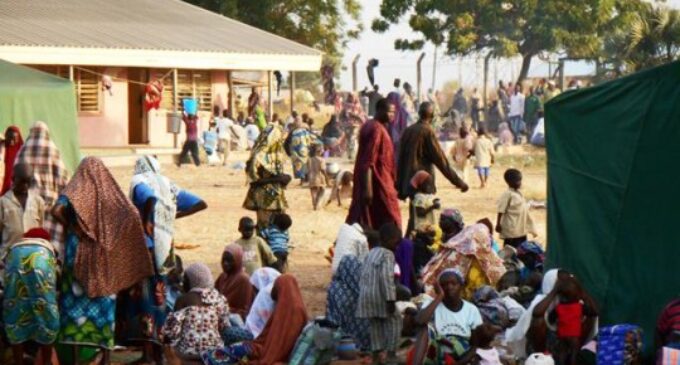Report: Borno IDPs battling severe hunger, homelessness after closure of camps

Human Rights Watch (HRW) says the shutdown of internally displaced persons (IDPs) camps across Maiduguri, the Borno capital, has worsened the living conditions of over 200,000 IDPs in the state.
The international non-governmental organisation gave an update on the situation in its latest report released on Wednesday.
According to the report, the IDPs are now battling severe hunger, lack of shelter and insecurity.
Borno is one of the north-east states greatly affected by the Boko Haram insurgency in Nigeria.
Babagana Zulum, governor of Borno, in October 2021, announced that all government-provided IDP camps in Maiduguri will be closed by December 31, 2021.
Zulum said the decision was informed by the improvement recorded in the security situation in the communities of the IDPs.
According to the HRW report, the development “compelled displaced people to leave the camps without consultation, adequate information, or sustainable alternatives to ensure their safety and livelihoods”.
The report said the situation is in “violation of Nigeria’s obligations under African regional law and international law on the rights of internally displaced persons”.
“As of August 2022, Borno state authorities had relocated over 140,000 people from eight camps shut down in Maiduguri since May 2021,” the report reads.
“Those closed include the Bakassi, Stadium, Teacher’s Village, Farm Center, Dalori I, Dalori II, Mogcolis, and National Youth Service Corps (NYSC) camps. Two camps—Muna Badawi and 400 housing estate (Gubio) vamp housing nearly 74,000 people—were also set to be closed later in the year.
“Altogether, the Borno State government’s move to shut down the camps in Maiduguri has affected or will affect over 200,000 displaced people.”
Some of the relocated IDPs are reportedly facing difficulties meeting their basic needs, while most of them had to build zinc structures and thatch on lands secured from private landowners.
‘MANY IDPS BATTLING SEVERE HUNGER’
In November 2021, the Borno government said IDPs will not be forced to relocate to their ancestral homes, noting that only those who have shown interest will be returned.
The governor also said the majority of the IDPs were willing to be relocated, adding that they will be supported with cash and means of livelihood.
The report however said many of the IDPs who returned to their communities had to engage in menial jobs to survive, while some of them had to start “selling firewood fetched from nearby bushes or hand-knitted caps”.
Others were said to undertake small jobs to earn “around 300-700 naira (US$0.52 – $1.21) daily”.
According to the report, in December 2021, the Borno government banned all humanitarian organisations from sharing food and relief items with resettled communities in Bama where residents had not received any support from the government.
The report said most of the resettled communities had no housing, water, healthcare services, schools and other infrastructure.
“Many displaced people in Maiduguri said they suffered severe hunger after agencies including the World Food Programme (WFP) and the Borno State Emergency Management Authority (SEMA) stopped providing monthly food rations and cash transfers for food,” the report said.
“This followed the state government’s pronouncement in October 2021 that the camps were set to be shut down by the end of that year. The food support stopped abruptly without any official notice or explanation.
“WFP officials told Human Rights Watch that the organization stopped providing food support to camps within their purview in Maiduguri, including Dalori I, Dalori II, and Gubio in November 2021 following the government’s announced closures.
“They said that although Dalori I and Dalori II were not shut down until August 2022 and Gubio currently remained open, WFP could not provide support to beneficiaries who were not factored into their plans for 2022 because of the slated shutdowns.
“Most of the displaced people who spoke to Human Rights Watch had to engage in income-generating activities for menial sums to support themselves even while they were still receiving aid in the camps.
“Some sold firewood fetched from nearby bushes or hand-knitted caps, while others carried out day labor or traded in food items or fruits, earning around 300-700 naira (US$0.52 – $1.21) daily, which could not support the basic needs themselves and their families after aid to the camps were cut off.
“State authorities distributed money (between 50,000 and 100,000 naira, or US$86.21 to US$172.41) to some individuals recognized as heads of household and wives in male-headed households before the camp closures, reportedly intending these funds as livelihood support.
“However, these funds were too little to provide any meaningful support for families to build their lives afresh and were used to meet immediate needs.
“Those who returned to Bama also had limited opportunities to earn income there. Because of security concerns, they were unable to go outside the town limits to access farmlands. Nigeria’s military in May and August 2022 launched airstrikes against insurgents in the area, indicating that the area remained insecure.
“Without any food aid, families affected by the actual or impending IDP camp closures said that they have faced severe challenges in meeting basic needs. Some said they have been forced to skip meals or go for days without something substantial or nutritious to eat.
“Some others, including children, have resorted to begging on the streets to survive despite the dangers this presents, such as road accidents, kidnapping, trafficking, and sexual violence.
“While Human Rights Watch’s research did not seek to quantify the people affected in this way, the interviews indicated that a sizeable number of displaced persons affected by camp closures were living in worse physical structures than in the camps.”
‘HAPHAZARD CAMPS CLOSURE, UNBUILT HOUSES’
The report further noted that the justification for relocating the IDPs was inappropriate, adding that the displaced persons were not properly consulted and informed before the exercise.
“Borno state authorities asserted that they had rebuilt houses in Bama that were previously destroyed in the conflict with Boko Haram,” the report reads.
“However, interviewees who had moved back to Bama said that they did not find their homes rebuilt. Some resorted to living in their partially destroyed homes, while others built thatch structures or tents in their compounds. Those living in the makeshift thatch structures in Maiduguri and Bama had no access to sanitation facilities, relying on pit latrines around their homes.
“The authorities conducted little or no consultation with displaced persons in the various camps, including those that would soon be closed. They did not provide adequate information to displaced persons that could have helped them make informed decisions about their next move.
“Though authorities did not publicly explain their camp shutdown process, a pattern emerged during the closures of some camps between November 2021 and August 2022.
“The closures that Human Rights Watch documented began with an unannounced visit to the camps very early in the morning by the state governor or his representatives, who would line up heads of households and wives to count them and hand out cards with numbers.
“In a subsequent unannounced visit, also in the early hours of the morning, government officials used the cards to identify people designated to receive money for livelihood support. Residents also received a date by which they were required to vacate the camps, usually within 10 to 15 days.
“This process not only gave people insufficient time to prepare but did not consider or provide for people who fell outside of the designated categories, such as unmarried young adults above the age of 18 who do not depend on their families for support.
“There was also no mechanism to include people who were away or unavailable at the time families were counted, or to monitor the process and ensure that everyone was treated fairly.
The report added that Nigeria has committed to upholding the rights of IDPs by ratifying the African Union convention for the protection and assistance of IDPs as established by the Kampala convention.
The Kampala convention gives IDPs the right “to be protected against forcible return to or resettlement in any place where their life, safety, liberty and/or health would be at risk”.
The Human Rights Watch urged the federal government to direct Zulum to withdraw all relocation plans and remove restrictions on humanitarian workers to enable the provision of life-saving assistance to IDPs.














There are no comments at the moment, do you want to add one?
Write a comment